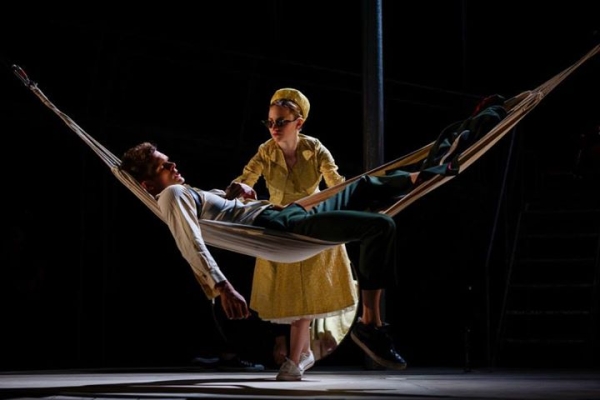Tristan & Yseult

(© Steve Tanner)
It's a rare production that can careen from unbridled joy to gut-punching sorrow in the space of a heartbeat, but that's precisely what England's Kneehigh ensemble accomplishes with Tristan & Yseult, currently playing at Chicago Shakespeare Theater.
This being a love story, it's no secret that it ends in tragedy. Where director Emma Rice's version (which she also adapted with writers Carl Grose and Anna Maria Murphy) distinguishes itself is in Kneehigh's audaciously creative and bone-authentic manner of telling the familiar story of star-crossed lovers. Rice and her Cornwall-based theater company will catapult you off an emotional cliff.
Any description of Tristan & Yseult's plot inevitably makes the whole thing sound like a soap opera: British King Mark (Stuart Goodwin) takes vengeance on a bellicose Irish warlord by abducting and marrying the invader's sister, Yseult (Etta Murfitt). Mark sends his beloved spiritual (and possibly biological) son Tristan (Andrew Durand) on a quest to bring the maid to Britain. Complications ensue when Tristan and Yseult fall in love. They spend the voyage to Britain having wild bungee-cord sex (the bungee cords allow for an innovative aerial pas de deux wherein lovers literally bounce off the walls with passion), but upon arrival, Yseult also falls in love with King Mark. The situation would be an eye roller of a cliché were the cast anything less than bone authentic.
As Yseult, Murfitt is everywoman, deftly depicting the guilt and rhapsody of overpowering, divided devotion. Durand's Tristan is all headstrong, smoldering sensuality. Together, the two spark with incendiary chemistry. Craig Johnson clowns with wild, touching abandon as Yseult's loyal-to-a-fault maid, and Stuart Goodwin is ravishing as the betrayed King Mark. And as the enigmatic Lady White Hands, Carly Bawden turns in a performance of potent rage and sorrow.
At the brokenhearted center of Tristan & Yseult are the zany, yearning denizens of the Club of the Unloved, the worldwide organization that nobody wants to join but that we all belong to sooner or later. In Tristan & Yseult, the club takes the form of an Eisenhower-era nightclub band, its awkward, bespectacled members led by Lady White Hands, a chanteuse who evokes the likes of Dinah Shore, Brenda Lee, and Vera Lynn. While Tristan and Yseult may be the stars of the story, it's the Club of the Unloved orbiting around them that creates the production's irresistible foundation of agony and ecstasy.
Clowning and acrobatic choreography are the hallmarks of Tristan & Yseult, but the clown averse shouldn't be discouraged from shelling out for a ticket. The production doesn't traffic in orange hair or whipped-cream pies. Rather, these clowns capture the tragicomic absurdity of the human condition. If you don't see (and laugh at) yourself in the raucous mania unfolding on stage, you just aren't paying attention.
The dance and stylized movement integral to the piece is similarly, wildly innovative. Along with the aforementioned bungee cords, there is also a gravity-defying human slinky that unfurls to the beat of its own drummer. Fragments of beautifully cryptic sign language evoke the thrall of love at first sight. A wedding is celebrated with the audience launching hundreds of white balloons through the theater.
Since music is the food of love, composer Stu Baker and conductor Ian Ross' soundscape is critically important. A crackerjack five-piece band (gathered onstage beneath a shocking pink-neon sign advertising the Club of the Unloved) provides a sonic spectrum that moves from naughty little sambas to epic Wagnerian powerchords. Baker's original pieces are woven through a roster of late 1950s pop ditties and torch songs, many of which seem to emanate from vinyl spinning on a record player. Every so often, a cast member will pick up an accordion and join in.
In the end, Tristan & Yseult pulses with love in all its permutations: passionate, platonic, unrequited, and reciprocal. The primal emotion is sprawling and messy onstage just as it is off. The Club of the Unloved may not be a group anyone wants to join. But you will willingly drink the potent theatrical potion its members proffer in Tristan & Yseult.











